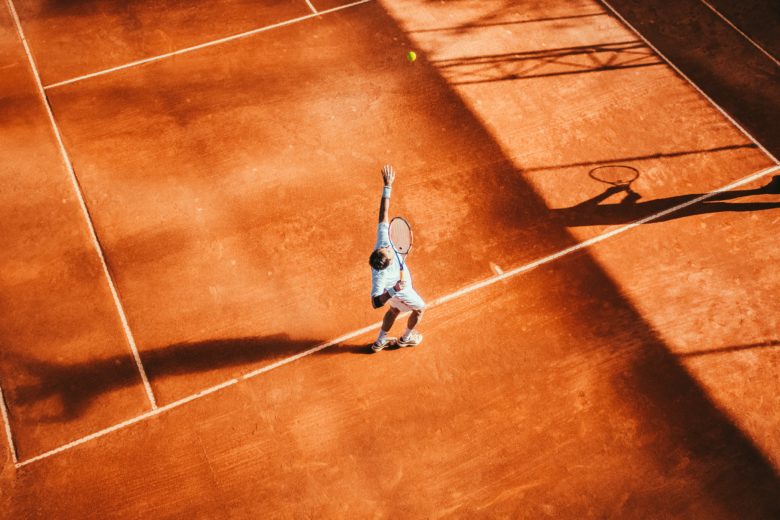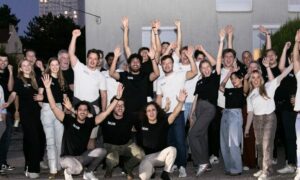8 Ways My Tennis Obsession Made Me A Better Manager And Entrepreneur

Ivaylo Ivanov is known as fintech entrepreneur and the CEO of P2P lending company Iuvo. At least during the day. The rest of the time he’s a passionate tennis player. His venture is currently among the top 5 in its field in Europe and has been nominated for startup of the year by Forbes twice, he’s been speaking at tech events from London to Budapest and from Amsterdam to Athens. However, to him, nothing compares to that one perfect backhand he hit that one time in practice. Ivaylo loves writing about business, travel, and sports, and decided to share some thoughts with the Trending audience too.
A set and a match point down in the final… make that three consecutive match points, actually. I did save another two in the previous game, so you can argue which one of us was having a worse day. What to do now?
As far back as I can remember, I’ve always wanted to build stuff, to create, to make something that wasn’t there before. I grew up in an entrepreneurial family. It sounds more sophisticated than it is really. Back then, in the wild west of the post-communist Bulgarian economy, everyone was pretty much an entrepreneur – there weren’t many companies to work for and you had to invent your own way to make ends meet.
Another special thing I got from my parents was tennis. They were and still are obsessed with the game and I grew up running around the courts in the Sea Garden in Burgas. It wasn’t however, until the past seven years of playing that I got to really understand the sport and its incredible depth and philosophy. This coincided with my career development as a manager and an entrepreneur and the parallels between the two are uncanny. They have served me to become a better professional in so many ways. Here I share the most important ones.
Be active, take the initiative
On any court (business or tennis) you swing between action and reaction. Exceptional tennis players always strive to be active, because it gives them the opportunity to impose their own tempo to the game. Make the initial call, set up the first meeting, open the discussion, opt to write the memo afterward (putting things the way you remember them). It all sets the tone for everybody’s roles and responsibilities after that. This is especially beneficial in the all-so-popular matrix structures that evolve in both new and century-old companies these days. Even in cases where you’d prefer a slower tempo – taking the initiative early on gives you the position to choose.

Be strong in your legs
An ex-pro player once told me: “tennis is played with the head, then the legs, and finally the arms”. Given you know in your head what goals you aim to achieve in your profession, you need to build the right legs for it, the fundamentals. When developing a new product, service or whole new business model, always place extra care in setting up the right base: legal, IT, human resource, specific know-how. Trying to hit the ball when you’re off-balance will give you 1 in 10 chance of making it. If you take extra time to set yourself up properly, this chance goes to 8 in 10. Not too bad. I know that MVP (minimum viable product) and ridiculously short time-to-market are all the hype right now, but I would argue that pivoting and changing direction rapidly is more important. And for that, you need strong legs.
Be prepared
I’m sure everybody digs deep when they set up a new business line or a process. But once you create your flawless concept, the actual work begins and it can be a real landslide: regulation concerns, legacy IT issues, people unhappy with the new setup, etc. Your mailbox is flooded and the endless meetings begin. Most of the attendees turn up unprepared and are there just because the date popped up in their calendar. And then there are the ones that actually have other agenda, conflicting with yours. Don’t let yourself be caught off-guard, risking delays or even failure. I play 110 tennis matches a year. After each one, I make notes on how the game went, my performance, the opponent’s actions, what was good and bad. Next time I meet this guy, I take my time to read and I already know how are things most likely to unfold. I’d say it’s much easier to do this in your business setting where you only have around 20 to 30 people to deal with. Take 30 minutes before the meeting and scroll through the mail threads, scan the attachments and make mental notes of what everyone’s agenda will most likely be. Chances are you’re going to be right. And after some practice, this exercise will take up 15 minutes, rather than 30.
Set yourself micro-goals
A couple of years ago I had the chance to meet Dani Vallverdu at an event. He used to coach Andy Murray, then he took up Grigor Dimitrov and now works with Stan Wawrinka. He said that part of his method is setting up really tiny micro goals. Goals for a specific shot, a point, goals for the next hour, the next day and the next week. It seems to me, this has two main benefits: first, it makes progress appear easier to achieve and second, it gives a sense of reward or opportunity for correction every time a deadline drops. Bill Gates says that “people overestimate what they can do in one year and underestimate what they can do in ten years.” I feel that Dani is playing on this note. The competitiveness of his players won’t allow them to fail a goal more than twice in a row… and probably by not that big of a margin. They will stretch more and more with each step and this way he’ll extract more from them in the long run than if he had set an impossible benchmark right from the beginning. I use this approach on myself with stable results so far.
Eyes on the ball
The phrase I hear most often from my coach is the simplest you can imagine in any sport: “Watch. The. Ball.” It was at the same time the hardest for me to learn. In the instant, before I hit my shot my eyes were already looking over to the other side of the court to see where the opponent is, where the ball is going to land and how he can react to it. And losing sight of the ball at this crucial moment of the contact with the racket creates many unforced errors. Too often as a manager, I see professionals failing to recognize what their main task at hand is and how it is connected to the end goal. They rush things and deliver subpar results in their attempts to move faster to the next stage. I try to keep my teams always focused on the contact with the ball – what is required from them, what is the sequence of movements and where do we want to go with this shot: are we aiming to attack or we need to keep ourselves in the rally.
Commit to your shots. If you think you’re going to miss, you will.
Tennis is a very complex sport in terms of coordination. You need to make very specific contact with a small object moving at over 70 km/h (at the amateur level). On top of this you’re not doing it with your own limbs but with an additional object, the racket, that you need to calculate for: weight, angle, swing. Each shot is a unique combination of position, speed, direction, spin, etc. Having this complicated equation before you many times per rally, it’s only natural that you doubt you’re going to solve it each time. However, this is usually a self-fulfilling prophecy: the moment you doubt your judgement, your arm flinches and you do miss. In my professional life, especially when developing completely new business, I have similar equations on a weekly basis. Cases where there is no good practice on the market, no benchmark to look at, no experts to consult with. So I need to go with my judgement. And I need to commit to it. Gather as much data as you can, find a look-a-like market that you can take as a reference, make assumptions from the cycles of the moon if you will, but create your action plan and go for it. There will always be a next shot, a next rally, a next game. You will always have the chance to correct your movement, so don’t let your own doubts sabotage you. There’s plenty of other things that can and will go wrong.
Choose your idols. Watch them. Dissect them.
Learning from watching has proven to be incredibly effective for me. I watch a ton of tennis, both live around the world and on TV. But I don’t watch it with beer, chips and a company of friends. I study it. Apart from the mechanics of the movements, I find it extremely interesting what choices do my favorites make in specific situations. How do they start a match, where do they serve when they face a breakpoint, what do they change when things go bad or what risks do they take when they’re ahead. And all of these vary in accordance to the opponent and the playing surface. The combinations and decision trees are huge. The key point is that I choose to study only players who have something which I can associate with and reliably use in my own game. For example, I respect and admire Nadal, but his character and style are far from me as a person and that’s why I don’t study him. I use the same criteria when I choose my business idols. I dissect different components from different leaders that I find relevant for me. For example, I’d study Warren Buffet’s long term investment strategy, Barack Obama’s collected public speaking, Stephen Hawking’s structured approach to solving complex problems. I read about them, I follow their careers, I watch them speak, I try to imagine why they take certain steps in certain situations. I don’t claim that I resemble Hawking or Obama, I just find it easier to dissect their characteristics than let’s say Elon Musk’s abstract and extreme action-driven approach. You can find him or Richard Branson a better fit – to each their own. The main point is to choose the relevant role models and not just follow the hype.
Be positive
Another thing I learned from my chat with Vallverdu. He argued that the most energy-consuming thing in the sport is trying to remain positive. A competitor’s reaction to failures is to overestimate the impact and beat themselves up. Fighting this impulse takes a toll on you, so you need to plan for extra efforts in this direction. Try focusing on your actions and distance yourself from the result. A lost point is just that – it doesn’t define you as a player. A mistake in your work doesn’t make you less of a professional. Tennis, just like business, is a fickle activity. Today you may be number 1, next month you’ll be number 51. Basically, in the eyes of the world, you’re only as good as your last month’s (trade) result. It’s easy to lose ground and rational grasp on reality – both in a good and in a bad sense. So see yourself as you truly are – a quality player that always tries to improve, no matter what.
So back to that final match. I did feel I was the favorite before the game – better technically, better prepared. I went in calm, believing. I set myself micro goals: to win the first point, the first game, to break first… and I did it all. Then why did I end up in this critical situation and what to do next? Sometimes in tennis and in business, there’s just that day when things happen irrationally. You can be as prepared as they come and still find yourself going downhill. Here comes probably the most important advice: be ready to win ugly. Not unfair(!), mind you, but ugly – be ready to grind, to reach, to dig, to make one more ball, one more move, to keep things going, to break the opponent’s momentum. The end justifies the means and the reward is worth it. My first title in tennis, after saving five match points, created a much stronger impact on me than these ugly slice backhands I needed to hit in the end of the game to keep it alive. History does remember winners. And winners persevere. Although it’s nice to look good, that Federer-esque backhand you hit that one time still counts as one point. Seeing your company outgrow competitors with years of head start weighs much more than the fact you had to endlessly negotiate with partners, pitch again and again in front of investors and not sleep for days and weeks at times handling banks and regulators.
And one last thing. You will never be at 100%. Be fine with this. No way the stars will align all the time, there will be no wind, the sun won’t shine in your eyes on serve and you’ll see the ball clearly and be in the right position to hit it wherever you want. Be fine with this, expect this. Keep building your capacity , so that when you’re at 80% or 60%, or 50%, it’s still enough to move to the next round and kick ass again.





























